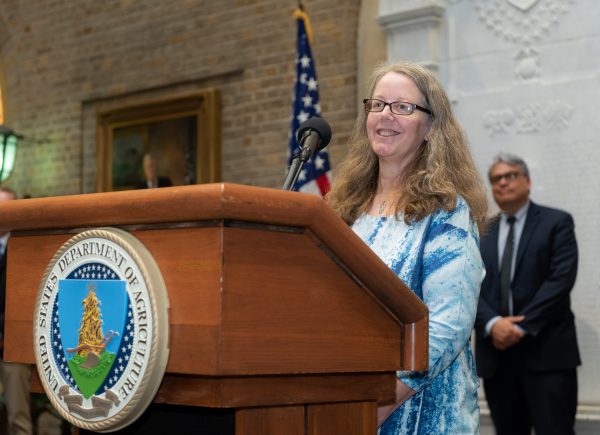October 21, 2019
 Crayfish, crawfish, crawdads or mudbugs…whatever you call them these crustaceans are an important linchpin of the ecology of aquatic ecosystems. There are hundreds of species of crayfish worldwide, with the majority occurring in North America particularly in the southeastern USA. Unfortunately, little is known about the habitat requirements and population status of most of these species. Efforts by Dr. Susan Adams, a Professional Affiliate of the Center for Biodiversity & Conservation Research, to develop methods to monitor different species of crayfish and to understand their natural history, recently earned her national recognition from the USDA Forest Service. In granting her the ‘2019 Rise to the Future Jim Sedell Research Achievement Award’ the agency noted “her years of research quantifying the effects of land management and disturbances on aquatic fauna and providing information helpful to the conservation of warmwater fishes and crayfishes.” The burrowing and foraging behavior of crayfish likely affect patterns of nutrient cycling, which help determine how aquatic communities are structured. At least 240 species of predatory animals (in addition to us) are known to rely on crayfish as a food source, raising concerns among scientists about the decline of crayfish populations. They estimate that four dozen crayfish species are already in need of population protection due to habitat destruction, pollution and other threats. In a recent publication, Adams and colleagues describe their study comparing various methods for monitoring crayfish populations at the Mississippi Sandhill Crane National Wildlife Refuge. The good news is that methods to manage the habitat at the refuge to favor this endangered bird seem to be good for crayfish populations as well. The bad news is that getting on their hands and knees to dig up muddy crayfish burrows seems to be the best way to track the abundance and diversity of these small, cryptic crustaceans. Dr. Adams’ leadership in crayfish research is recognized throughout the world. She is a Past-President of the International Association of Astacology and is the first U.S. woman to have served as president of the professional society since it was founded 45 years ago. Dr. Adams is a research aquatic ecologist with the USDA’s Center for Bottomland Hardwoods Research in Oxford, Mississippi.
Crayfish, crawfish, crawdads or mudbugs…whatever you call them these crustaceans are an important linchpin of the ecology of aquatic ecosystems. There are hundreds of species of crayfish worldwide, with the majority occurring in North America particularly in the southeastern USA. Unfortunately, little is known about the habitat requirements and population status of most of these species. Efforts by Dr. Susan Adams, a Professional Affiliate of the Center for Biodiversity & Conservation Research, to develop methods to monitor different species of crayfish and to understand their natural history, recently earned her national recognition from the USDA Forest Service. In granting her the ‘2019 Rise to the Future Jim Sedell Research Achievement Award’ the agency noted “her years of research quantifying the effects of land management and disturbances on aquatic fauna and providing information helpful to the conservation of warmwater fishes and crayfishes.” The burrowing and foraging behavior of crayfish likely affect patterns of nutrient cycling, which help determine how aquatic communities are structured. At least 240 species of predatory animals (in addition to us) are known to rely on crayfish as a food source, raising concerns among scientists about the decline of crayfish populations. They estimate that four dozen crayfish species are already in need of population protection due to habitat destruction, pollution and other threats. In a recent publication, Adams and colleagues describe their study comparing various methods for monitoring crayfish populations at the Mississippi Sandhill Crane National Wildlife Refuge. The good news is that methods to manage the habitat at the refuge to favor this endangered bird seem to be good for crayfish populations as well. The bad news is that getting on their hands and knees to dig up muddy crayfish burrows seems to be the best way to track the abundance and diversity of these small, cryptic crustaceans. Dr. Adams’ leadership in crayfish research is recognized throughout the world. She is a Past-President of the International Association of Astacology and is the first U.S. woman to have served as president of the professional society since it was founded 45 years ago. Dr. Adams is a research aquatic ecologist with the USDA’s Center for Bottomland Hardwoods Research in Oxford, Mississippi.